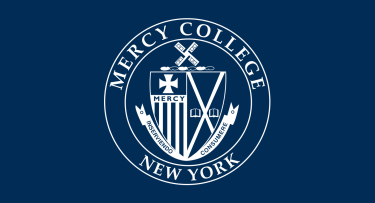Mercy Student Collaboration with IBM Watson and Pearson Advances Artificial Intelligence as a Learning Support

Last fall, Mercy College hosted a meet-and-greet with an unusual guest. The visitor drawing crowds to the Dobbs Ferry Campus was neither a celebrity nor a rock star, but a 4-foot-tall robot named Pepper.
Programmed to respond naturally to human emotions and behaviors, the winsome and engaging Pepper delighted the crowd by demonstrating it can move, talk and respond in ways that seem almost human—often called artificial intelligence, or AI.
The objective of Pepper’s visit was to call attention to Mercy’s participation with IBM Watson and Pearson in an educational endeavor called the User Sponsorship Collaboration. The program has been so successful that Mercy College, IBM Watson and Pearson recently announced the signing of a new memorandum of understanding that will continue the experimental program for another year.
Hundreds of students met and interacted with Pepper, and many volunteered to try out and offer feedback on an IBM program called Watson for Higher Education. Watson, the name given to an IBM supercomputer, applies advanced learning technologies, including natural language processing and reasoning, to many situations.
Student feedback has proved so valuable to IBM that the company has offered credit to participating students for their design assistance. The micro credential, which was developed in concert with Mercy’s academic administration, is awarded as a digital badge that can be displayed on the student’s LinkedIn page or other digital presences.
“What’s fascinating about computers like Watson and Pepper is their capacity for learning, and how readily college students will interact with them,” said Victoria (Tori) Mondelli, Ph.D., Mercy’s Executive Director, Office for Teaching Excellence & Engaged Learning. “We see tremendous potential here, and Mercy is exploring the possibilities.”
The idea for Pepper’s visit began last year when Mondelli was invited to participate in a session about AI in education, a featured track of a conference hosted by EDUCAUSE, a well-known professional association for technology in higher education. The lead IBM Watson researcher, Dr. Satya Nitta, told Mondelli about the various ways AI can be applied as a learning support for college students. While IBM Watson had already made inroads in the K-12 setting with organizations like Sesame Street, they were eager to find college and university-level partners. Mercy soon joined as a participating school.
“Watson is a powerful educational tool that can provide students guidance as they work, helping them make sense of a new knowledge-base or domain,” said Mondelli. The Watson Tutor prototype works with a student at his/her pace to support student learning and mastery. Watson Tutor assesses student performance and guides the student with thoughtful prompts, hints and feedback, and explanations.
The program also provides classroom instructors with insights about how well their students are learning, allowing them to better manage the entire course and flag students who need additional help.
“Watson can be an especially effective learning support,” said Mondelli. “When you think about it, Watson as a virtual tutor has all the time in the world. That’s incredibly helpful for students who are busy with jobs and responsibilities in addition to the demands of their classes.
“We’re also discovering that students don’t feel judged by Watson,” she continued. “The common fear of asking a question that may be perceived as naïve doesn’t occur. Students readily admit they don’t know, and simply tell Watson, ‘IDK’ [digital shorthand for I don’t know]. It frees them to be curious and ask more questions. That really helps learning.”
Through the Sponsor User Program, students volunteer to complete a computer learning module with Watson as a guide. When the module is complete, Watson asks for the student’s feedback on its own performance. In this way, students are helping train Watson in a number of areas, such as improving its understanding of regional idioms and slang.
“After conducting these design sessions, we talked with the students,” said Mondelli. “They told us they enjoyed the interaction and are eager for a future when they can each have their own friendly robot to help them not only with academic subjects, but also with managing their time and making good life choices. In Japan, AI robots are beginning to fulfill vital healthcare needs with an aging population. Here in New York, Mercy College is pursuing AI for our student learning and success mission. We’re very pleased that IBM Watson and Pearson have elected to continue working for another year with Mercy on this exciting new avenue for collaboration between educators and technologists.”
Watch this video for more about Pepper at Mercy College.
